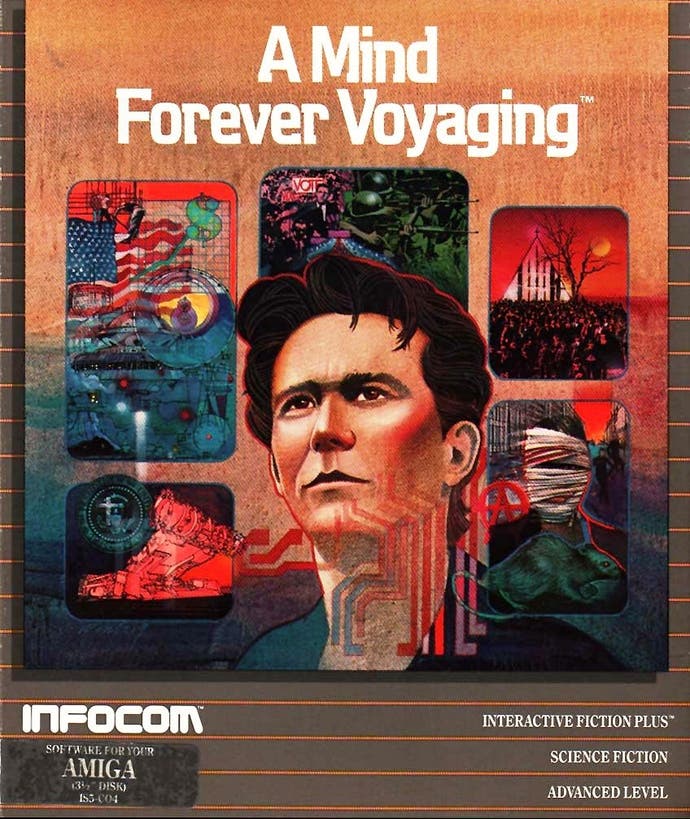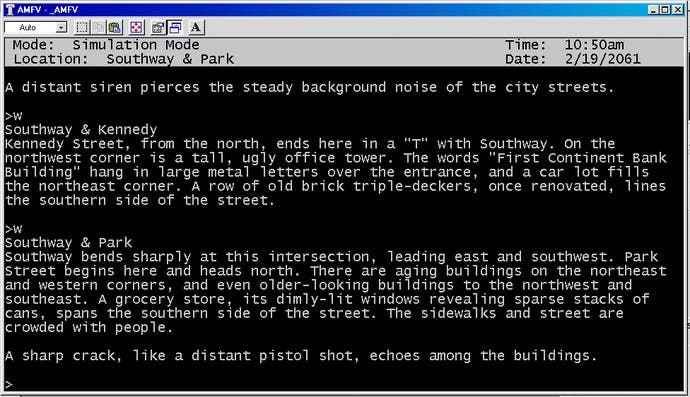A Mind Forever Voyaging - Interview Steve Meretzky
How a game from 1985 can still be up to date
And from my pillow, looking forth by light
Of moon or favouring stars, I could behold
The antechapel where the statue stood
Of Newton with his prism and silent face,
The marble index of a mind for ever
Voyaging through strange seas of Thought, alone.
William Wordsworth, The Prelude
Political conflicts, intercultural tensions and changes in society can occur in radical and very immediate shifts and even explode into revolutions within days. We notice them immediately, follow them on our screens, read the real-time analysis and see the tweets that pour in within every second of exciting times. But what of the revolutions and the counter-revolutions that take decades? The ones that span generations, but are not driven by contemporary zeitgeist, not by single institutions or people - that would be a bit too close to conspiracy-theories - but still by ideas, ideals and beliefs of how the world should work.
Ideas like the one that the deregulation of all private economical and financial sectors - be it environmental regulations for the heavy industry or the limits of power for Wall Street - will be for the common good, because it strengthens the economy and raises the prosperity and the well-being of society as a whole. Ideas like the one that governmental intrusion is never the solution, but instead part of the problem and that therefore there is a need to reduce its influence, financial means and servants to a minimum. With the notion that this minimum consists mainly of a strengthened military branch, which will define the position of a country through strength and that it is in the interest of its society to be ready to go to war at any time. Ideas like the one, that a strong society is forged by a strict code of moral and conduct and also religious ideals; that acting tough on any form of crime, and punishing it even harder, will be the solution for a rising crime rate. That radical tax cuts, to be introduced along with a reduction of social-welfare-expenses, will let a free and productive society thrive.
"Man is not free unless government is limited."
Ronald Reagan

Those ideas were hardly new, when Steve Meretzky´s text adventure A Mind Forever Voyaging was released in 1985. Some of that is the basic legacy of the traditional conservative worldview in the US. In the 60s, law and order carried Nixon into the White House, it was a form of mainstream-reaction to the counterculture-movement. Like no one before him, Ronald Reagan stood for the credo, that the government must be kept as small as possible, that state-regulations should not interfere, unless it is absolutely necessary, even though his practical policies have not always reflected this image.
If you are successfull, you must be right. Right?
Nonetheless, the so called Reagonomics were a deep incision into the economical policies of the US in the 80s and with that came a slow turning in the social fabric of the nation. It was a radical shift in parts of the taxation-system, which aimed for reduced government spending. All under the axiom that lower tax-rates and with them an economical deregulation through all branches of the economy as well as a deregulation of the ecological requirements will bring down the high unemployment and inflation rates the early 80s had seen. It was a model for a society aimed toward private consumption, and with it continuous growth was established - more so than before. This led to presentable successes in the mid-80s. Inflation was slowed, unemployment dropped significantly. The soundness of the taken measures was proven by success?

Meretzky, judging by his work on this game, must have been a liberal-progressive thinker on the left side of the spectrum and he was not comfortable with those ideas and measures, even when they produced results, which could be proven by the numbers: between 1983 and 1985, unemployment in the US dropped from a devastating 11 percent to a relatively normal rate of 8 percent. The question that the MIT-graduated programmer seemingly asked himself was simple: yes, now - 1985 - everything looks fine. But what will the consequences of those measures look like in the far future, decades later?
Meretzky´s answer can be found in A Mind Forever Voyaging: They will be catastrophic.
But at least they can be avoided. If the nation and with it humanity wants to. The almost campy utopian future the game's finale paints, shows what will happen when the opposite of the plan is installed: when a caring, humanist, cautious and basically ideal state is created and lived by such a society. World peace, overpopulation solved by space-travel, everybody is happy, everybody cheers.
But to get there, the player is sent through a hell, that feels all to real.
Citizen in the machine
After the start of the game, the player finds himself as an AI in a simulation. The year is 2031 and an US-Senator presents a plan for a "renewed national purpose". The country suffers like it did back in the early 80s, even more so. At its economical core, the plan is a more radical version of the Reagonomics, the social side involves a strict embodiment of hard conservative ideas. The simulation is supposed to find out how the plan will develop over time and shows a picture of a world that could be in an interval of 10-year-jumps. The playe has no influence ever these jumps, but is merely a spectator of the things that will be, so they can be analyzed back in 2031.

While in 2041 things are indeed looking up, they start to turn bad fast in the later decades. A police state is established which reigns over the street with despotism. The reduction of all government spending beyond the harsh law & order necessities speeds up the unraveling of the social fabric. Ever more radical sentences are issued, only to be replaced by public propaganda trials that paint a dark caricature of the judicial system. The cultural degeneration is shown in the papers and the movies in the cinemas. The breakdown of the social structures shows in the evermore barbaric behavior of the people towards each other. The gap between rich and poor widens to a frightening degree, a radical Christian sect establishes itself to the point, where everything shifts towards a theocracy and it all concludes in what is basically the breakdown of society 50 years after the plan was set in motion.
Still, A Mind Forever Voyaging is a positive work of art, since the player can confront and expose the "evil" senator in a quite clever showdown, so his plan will not be used, but instead a better one is researched with the help of the simulation, which might ultimately lead to mentioned utopia. No question, Meretzky takes it to the extreme both times. But that is the prerogative of science fiction.
A Mind Forever Voyaging was created 27 years ago and, only a short time before writing these lines, the US voted for a new president in November 2012. The ideas with which the republican candidates Mitt Romney and Paul Ryan entered the contest where far more radical than they were in the 80s. And though they lost the election, they still came pretty close. The culture wars seem to be far from over.
The basic maxims to the right of this war haven´t changed that much either. There were - and still are - a lot of calls for lowering the already comparably low tax-rates, especially for companies and businesses. That Washington should stay out of education and public healthcare as much as possible. The same does not apply for military spending, which of course should be raised. And looking at some of the more right-leaning groups, there is not a lot of support for equality-rights in any form to be found, be it for women´s equal rights or same-sex couples. Such phobias are not indulged as openly as they have been once, but they do exist and over the last months they sometimes even made it to the big stage.
Looking at the Republican Party today, it is often said that even Ronald Reagan, judging by his applied policies in the 80s, would have no place in the party that worships him. The shift to the right has gone too far even for his policies to be elected in today's primaries. The plan for a "renewed national purpose" in A Mind Forever Voyaging which has been painted as very radical version of the policies of the 80s, is pretty much a blueprint for a lot of the topics and arguments that have been brought up over the last months of the presidential election, especially during the preceding Republican primaries. And then they were ably amplified through various news channels, pundits and radio hosts. A Mind Forever Voyaging doesn't draw a perfect picture of the great plan, it just has to reduce itself to small impressions and keywords, mostly due to technical limitations. But then again, those seem to work just fine in the media world today, especially within the branches just mentioned, to build up a solid public opinion with broad effect.

This reduction and shaping of information to easily graspable themes instead of the complex social and economic issues they were before, seems to have intensified over the last 20 years or so, especially within various news-networks, could be one of the reasons, why Meretzkys vision of the year 2031 still seems adequate instead of obsolete. A counter-counterculture-movement contrary to the ideals of the movements that go back to `68 was in full swing over the last few years and it still has to be seen if the outcome of the election took the wind from its sails for good or just slowed it down for the time being. 27 years later, enough parts of the plan keep floating around through the right-wing sphere that it would be easy to piece together the whole thing. So, while things look up right now, there are still a few years to go until 2031. It is kind of frightening that A Mind Forever Voyaging as a whole has not degraded in its relevance. It still can be counted as some kind of dark prophecy, that has yet to be averted.
Still on track(?)
Does it matter which of the two parties have a hold over the White House? Yes, but it seems that only the speed at which the spiral turns towards A Mind Forever Voyaging's vision is affected. Since the End of Ronald Reagan´s presidency democratic presidents have been in office longer - if only slightly - than republican presidents, but yet the timetable for Meretzkys 2031 seems to be mostly on track. The minimum wages have been raised under the Democrats, they have managed to establish Obama-Care as the "law of the land", how congress-speaker John Boehner put it, although he and a lot of other Republicans fought tooth and nails against it over the last years. On the other side: The Democrats seem not to oppose the idea of indefinite detention without a trial too much. The Bush-era-tax-cuts are still debated after one complete Obama-term and so far there have hardly been any real attempts to regulate the banking sector, even after it nearly crashed the worldwide economy in 2008. These and other decisions over the last years may not speed up the way towards Meretzkys scenario too much, but they also do precious little to steer against such an outcome.

Most of this has been about the US - since it is the game's focus - but parallels to other countries can be drawn easily. The London's and Frankfurt's banking sectors are as deregulated as they always have been - even though some token-actions were taken -, the divide between rich and poor is widening as it is in the US and a lot of different social issues within the societies are following - Occupy may have faded mostly by now, but the reason it popped up is still there. Greece and Spain are hurting badly - to put the disastrous situations mildly - and the light at the end of this dark tunnel seems still far away.
In the face of this and keeping in mind that there seems to be plenty of support left for a lot of parts of the "renewed national purpose"-plan, one can only hope, that A Mind Forever Voyaging just painted it a bit too black. We can hardly reset reality the way the players starts the simulation anew.
Steve Meretzky: 27 years after A Mind Forever Voyaging - Interview
I would have been a lot more pessimistic in answering that question 5 years ago, coming out of the Bush era. But now that Obama has been elected and re-elected, there's finally movement on gay rights, and the idiotic war on drugs (http://en.wikipedia.org/wiki/War_on_Drugs) finally seems to be running out of steam, I'm a lot more hopeful. On the other hand, Congress continues to be pretty dysfunctional, the Republican Party is under the thumb of complete wackos, and the US is an armed camp with no appetite for gun control (witness yesterday's horrific shooting in Connecticut). So, while I'm optimistic that we'll be in a better place in 2031 than A Mind Forever Voyaging postulates, it's no slam-dunk.
"While I'm optimistic that we'll be in a better place in 2031 than A Mind Forever Voyaging postulates, it's no slam-dunk."
Steve Meretzky

It was right after Reagan's landslide re-election, which completely depressed me, because I considered him to be a doddering brainless puppet for right-wing forces: deficit-raising, religious right-pandering, war-mongering, civil rights-trampling zealots.
My views haven't changed much. My political views were mostly forged by anti-Nixon sentiments during the Watergate scandal. As I said above, I was pretty horrified, not just by Reagan's re-election, but by the fact that he was re-elected in a landslide. I felt like a huge number of Americans were fooled by an avuncular smile and a twinkling eye, and didn't realize how these Reagan-era policies were leading the country in such a wrong direction. At the same time, I thought that interactive fiction - because it had such a hold on players, who would think about the games not just during the time they were playing, but even during their time away from their computers - represented an ideal opportunity to try to change minds.
"Will this be 2081..."

2004 was probably my lowest point, after Bush's narrow re-election despite having already trashed the economy (tax cuts for millionaires who didn't need a tax cut, resulting in record deficits) and our foreign policy (embroiling us in an illegal and unnecessary war in Iraq, and ruining our relationship with most of the world). But, as I said in my first answer, I feel a lot better today.
It sold about 40,000 copies during its first year, compared to about 100,000 copies for my first two games (Planetfall and Sorcerer). Part of this was the long, gradual decline of text games, that would result in Infocom's demise 4 years later. Partly, it was because A Mind Forever Voyaging was the first “Interactive Fiction Plus” game, requiring 128K of memory instead of only 64K of memory; thus, it wouldn't run on a lot of the installed base of that time, such as all Commodore 64s, and the earlier Apple IIs. While the political message may have also been a factor, I don't think it was that big a factor. In fact, I got a lot more complaints from fans that the game was too quick to get through, and didn't have enough puzzles; I got almost no complaints about the game's message.
I think there will always be people impressed by a marriage between entertainment and exploration of serious topics; and I think there will always be people who say “screw that message shit; I'm here to have a fun time”. I don't think things would be very different now than in 1985 (other than the fact that games are much more widespread and accepted these days, so there's a bigger potential audience today).
There are certainly different issues that I'd focus on today, compared to 1985. As I mentioned earlier, gun violence is one I'd focus on. Another one would be anti-science, people refusing to acknowledge proven scientific facts like evolution and climate change. But I think the same basic structure would work today, even if specific issues changes.
"...or this?"

Yes. The Republican Party feels exactly the same as the Republican Party of 1985, only even more so.
I wanted a literate-sounding title, so I spent a lot of time searching through poetry and books of quotes, and finally came across that bit of Wordsworth. I didn't think the title would work by itself, but I thought that if I married it with quotes at the start of each of the game's chapters, and used the longer Wordsworth quote as the quote to start the final chapter, it would work. I think it did.
By the way, I only recently learned that that Wordsworth quote appears on the original Apple Computer logo.
Here's another quote, from Man of La Mancha: “Maddest of all is to see life as it is, and not as it ought to be.” When you go hiking in the woods, you're told to remember to bring out your trash … leave the woods as nice as you found them. I've always thought that even better is to pick up some litter along the way, and leave the woods just a little bit better than you found it. That's kind of the way I think of life as well … I hope to leave the world a little big better than I found it. A Mind Forever Voyaging was an attempt to do that, certainly not my only attempt, and certainly not my last.
